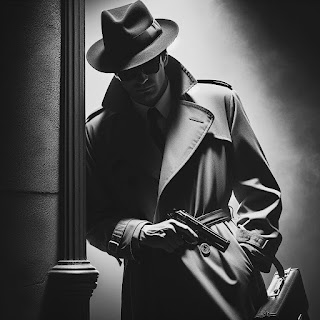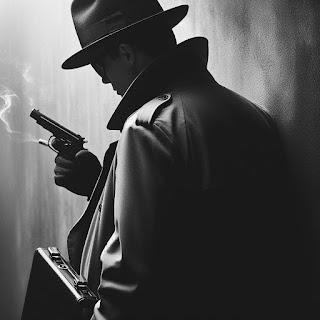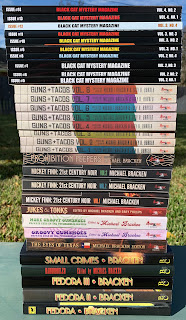I was glancing at a not-so-recent Stacker.com ‘Best 100 Spy Movies of All Time’, thinking it was right up the dark alley of our spymaster, David Edgerley Gates. If you did something extremely stupid, he could make you disappear.
And then I noticed something stupid.
Where was Ipcress File? And Day of the Jackal? Manchurian Candidate? Riddle of the Sands? Casablanca? And where the hell was 39 Steps? And why the Hail Freedonia was Duck Soup in the list? Hey, I love the Marx Brothers but it bears as much resemblance to a spy movie as Margaret Dumont does to John le Carré.
I had to stop because so many possibilities flooded my mind. The article should be retitled ‘100 Pretty Good kinda-Spy Movies of Small Time, Give or Take.’ I bet David could name many more.
So here is the core of Stacker’s list followed by a few unranked suggestions of my own.
| 100 | Body of Lies | 2008 | Ridley Scott | 50 | Clear and Present Danger | 1994 | Phillip Noyce | |
| 99 | Salt | 2010 | Phillip Noyce | 49 | Rogue One: A Star Wars Story | 2016 | Gareth Edwards | |
| 98 | Moonraker | 1979 | Lewis Gilbert | 48 | Breach | 2007 | Billy Ray | |
| 97 | Never Say Never Again | 1983 | Irvin Kershner | 47 | Spy | 2015 | Paul Feig | |
| 96 | Shadow Dancer | 2012 | James Marsh | 46 | Eye in the Sky | 2015 | Gavin Hood | |
| 95 | Octopussy | 1983 | John Glen | 45 | Mission Impossible: Ghost Protocol | 2011 | Brad Bird | |
| 94 | The Man from U.N.C.L.E. | 2015 | Guy Ritchie | 44 | The Bourne Identity | 2002 | Doug Liman | |
| 93 | The Informant! | 2009 | Steven Soderbergh | 43 | Red Cliff | 2008 | John Woo | |
| 92 | The Eagle Has Landed | 1976 | John Sturges | 42 | Emperor and the Assassin | 1998 | Kaige Chen | |
| 91 | Atomic Blonde | 2017 | David Leitch | 41 | Flame & Citron | 2008 | Ole Christian Madsen | |
| 90 | Until the End of the World | 1991 | Wim Wenders | 40 | Inherent Vice | 2014 | Paul Thomas Anderson | |
| 89 | You Only Live Twice | 1967 | Lewis Gilbert | 39 | No Way Out | 1987 | Roger Donaldson | |
| 88 | Cloak & Dagger | 1984 | Richard Franklin | 38 | Black Book | 2006 | Paul Verhoeven | |
| 87 | The Fourth Protocol | 1987 | John Mackenzie | 37 | The Age of Shadows | 2016 | Kim Jee-woon | |
| 86 | RED | 2010 | Robert Schwentke | 36 | Mission Impossible: Rogue Nation | 2015 | Christopher McQuarrie | |
| 85 | Mission: Impossible | 1996 | Brian De Palma | 35 | The Bourne Supremacy | 2004 | Paul Greengrass | |
| 84 | Snowden | 2016 | Oliver Stone | 34 | Europa Europa | 1990 | Agnieszka Holland | |
| 83 | Allied | 2016 | Robert Zemeckis | 33 | Lady Vengeance | 2005 | Park Chan-wook | |
| 82 | The Matador | 2005 | Richard Shepard | 32 | Dr No | 1962 | Terence Young | |
| 81 | Michael Collins | 1996 | Neil Jordan | 31 | Inglourious Basterds | 2009 | Quentin Tarantino | |
| 80 | Eye of the Needle | 1981 | Richard Marquand | 30 | The Imitation Game | 2014 | Morten Tyldum | |
| 79 | Horror Express | 1972 | Eugenio Martín | 29 | The Man Who Knew Too Much | 1956 | Alfred Hitchcock | |
| 78 | Patriot Games | 1992 | Phillip Noyce | 28 | The Quiet American | 2002 | Phillip Noyce | |
| 77 | OSS 117: Cairo, Nest of Spies | 2006 | Michel Hazanavicius | 27 | A Beautiful Mind | 2001 | Ron Howard | |
| 76 | The Front Line | 2011 | Jang Hoon | 26 | Infernal Affairs | 2002 | Andrew Lau, Alan Mak | |
| 75 | Thunderball | 1965 | Terence Young | 25 | Tinker Tailor Soldier Spy | 2011 | Tomas Alfredson | |
| 74 | The Hunt for Red October | 1990 | John McTiernan | 24 | Ghost in the Shell | 1995 | Mamoru Oshii | |
| 73 | Spy Game | 2001 | Tony Scott | 23 | The Constant Gardener | 2005 | Fernando Meirelles | |
| 72 | Mission: Impossible III | 2006 | J.J. | 22 | Bridge of Spies | 2015 | Steven Spielberg | |
| 71 | Despicable Me 2 | 2013 | Pierre Coffin, Chris Renaud | 21 | Skyfall | 2012 | Sam Mendes | |
| 70 | True Lies | 1994 | James Cameron | 20 | From Russia with Love | 1963 | Terence Young | |
| 69 | Dead Men Don't Wear Plaid | 1982 | Carl Reiner | 19 | Casino Royale | 2006 | Martin Campbell | |
| 68 | The Falcon and the Snowman | 1985 | John Schlesinger | 18 | Enter the Dragon | 1973 | Robert Clouse | |
| 67 | The East | 2013 | Zal Batmanglij | 17 | The English Patient | 1996 | Anthony Minghella | |
| 66 | Official Secrets | 2019 | Gavin Hood | 16 | Mission: Impossible: Fallout | 2018 | Christopher McQuarrie | |
| 65 | Lust, Caution | 2007 | Ang Lee | 15 | The Conversation | 1974 | Francis Ford Coppola | |
| 64 | Sneakers | 1992 | Phil Alden Robinson | 14 | House of Flying Daggers | 2004 | Yimou Zhang | |
| 63 | Fair Game | 2010 | Doug Liman | 13 | Stalag 17 | 1953 | Billy Wilder | |
| 62 | Confessions of a Dangerous Mind | 2002 | George Clooney | 12 | Goldfinger | 1964 | Guy Hamilton | |
| 61 | Charlie Wilson's War | 2007 | Mike Nichols | 11 | The Bourne Ultimatum | 2007 | Paul Greengrass | |
| 60 | Kingsman: The Secret Service | 2014 | Matthew Vaughn | 10 | Letters from Iwo Jima | 2006 | Clint Eastwood | |
| 59 | Three Days of the Condor | 1975 | Sydney Pollack | 9 | Zero Dark Thirty | 2012 | Kathryn Bigelow | |
| 58 | GoldenEye | 1995 | Martin Campbell | 8 | Le Petit Soldat | 1963 | Jean-Luc Godard | |
| 57 | Walk on Water | 2004 | Eytan Fox | 7 | Barry Lyndon | 1975 | Stanley Kubrick | |
| 56 | Marcel Proust's Time Regained | 1999 | Raoul Ruiz | 6 | The Departed | 2006 | Martin Scorsese | |
| 55 | Where Eagles Dare | 1968 | Brian G. | 5 | Duck Soup | 1933 | Leo McCarey | |
| 54 | Top Secret! | 1984 | Jim Abrahams, Zucker Bros. | 4 | The Lives of Others | 2006 | Florian Henckel von Donnersmarck | |
| 53 | A Most Wanted Man | 2014 | Anton Corbijn | 3 | Notorious | 1946 | Alfred Hitchcock | |
| 52 | The Spy Gone North | 2018 | Yoon Jong-bin | 2 | Pan's Labyrinth | 2006 | Guillermo del Toro | |
| 51 | X-Men: First Class | 2011 | Matthew Vaughn | 1 | North by Northwest | 1959 | Alfred Hitchcock | |
| The 39 Steps | 1935 | Alfred Hitchcock | Topaz | 1969 | Alfred Hitchcock | |||
| Day of the Jackal | 1973 | Fred Zinnemann | Riddle of the Sands | 1979 | ony Maylam | |||
| The Ipcress File | 1965 | Sidney J Furie | Casablanca | 1842 | Michael Curtiz | |||
| The Manchurian Candidate | 1962 | John Frankenheimer | Dark of the Sun | 1968 | Jack Cardiff |
For worst movie, I seem to recall Our Man Flint (1966), directed by Daniel Mann, was embarrassingly awful.
What is your take? Enquiring spies want to know.
Check out Prohibition Peepers, a Michael Bracken anthology.




























